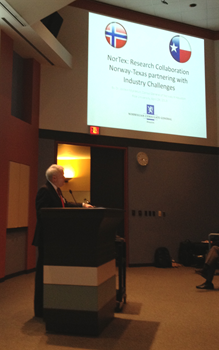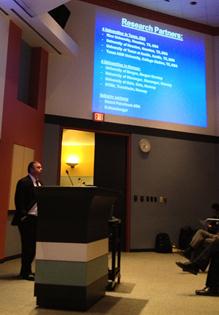NorTex is a collaboration among four Norwegian universities, four
universities in Texas, and oil- and service-industry companies in Texas and in
Norway. The objectives of NorTex Petroleum Cluster are to initiate or strengthen
and coordinate collaboration on petroleum-related education and research
cooperation between Norway and Texas. The Cluster will assist in facilitating
industry funding for adjunct and chair positions at the collaborating
universities, emphasizing the NorTex collaboration. The Cluster will emphasize
challenges to the industry, drawing on the expertise of academics to help solve
them.
 Consul
General Jostein Mykletun giving a short introduction into what NorTex is and how
it started, at the Rice Consortium for Processes in Porous Media at Rice
University.
Consul
General Jostein Mykletun giving a short introduction into what NorTex is and how
it started, at the Rice Consortium for Processes in Porous Media at Rice
University.The concept of NorTex traces back to Transatlantic
Science Week 2012, which was held in Houston, when a total of 600 participants
were in attendance, including a delegation of 200 who traveled from Norway to
Texas specifically for the event. Among the Norwegian delegation were five
university rectors and 20 deans from distinguished Norwegian universities -- the
University of Oslo, University of Bergen, University of Stavanger, University of
Tromsø, and NTNU in Trondheim -- who came both to participate in the conference
and to seek out common interests where cooperation would be beneficial.
From a Norwegian perspective it has been a clear statement that Texas is
important, as seen by three parliamentary delegations visiting the last three
years, as well as two Ministers of Health and Care Services, two Ministers of
Education and Research, the Minister of Defense, and the Minister of Petroleum
and Energy.
When Ola Borten Moe, the current Minister of Petroleum and Energy, came to
Houston in June 2012 he visited University of Texas, Austin and familiarized
himself with Statoil’s academia program, in which Statoil funds UT Austin with
$5 million in an attempt to transfer research from paper into action.
Consequently, the increased presence of Norwegian companies and people has
strengthened ties between Norway and Texas, which in turn has increased the
relevance of a formalized collaboration between these two entities. As a result,
the notion of NorTex was born.
In 2012 the Ministry of Foreign Affairs in Norway commissioned a pilot study
to explore the feasibility of establishing a Texas-Norway Partnership covering
science, technology, innovation, entrepreneurship; focused on energy and
medicine/healthcare. As an outcome of the pilot study and Transatlantic Science
Week came NorTex, the suggested establishment of a Norway-Texas Energy and
Biomedical Science and Technology Partnership, which is meant to result in
exchange of students, teachers, and industry professionals and to improve
research collaboration between universities and industry. More details are found
in: the Transatlantic Science Week (TSW12) report:
http://www.nortexpetroleum.org/reports/TSW12%20Report%20-%20v1.11.pdf and the
Norwegian Consulate General NorTex report:
http://www.nortexpetroleum.org/reports/NorTex%20report.pdf.
 Professor
Arne Graue presenting the NorTex Petroleum Cluster to an audience at Rice
University
Professor
Arne Graue presenting the NorTex Petroleum Cluster to an audience at Rice
UniversityThe main area of focus for the Cluster is to initiate and expand
collaboration on petroleum education and research between universities and
industry in Norway and Texas, and further to integrate relevant industry into
the different university collaborations. Members in the Executive Board of the
NorTex Petroleum Cluster are from University of Bergen, University of Stavanger,
and NTNU in Trondheim, and in Texas: Rice University, University of Houston,
University of Texas at Austin, and Texas A&M. Also, the Board Members from
the industry this far include Schlumberger and Statoil. The number of companies
in the Cluster will increase as the level of activity increases; the startup
phase will be focused on EOR.
As a starting point the board suggested two adjunct professor positions in
Norway and two in Texas, where the position will demand a certain time spent at
the host institution. The commitment for the position will be one year, with the
opportunity to stay on for a total of three years. When activity increases the
number of adjunct professorship are to be increased to four in both Norway and
Texas, and to further integrate industry into academia. The Board promotes the
exposure of industry challenges to the academia by facilitating industry funding
for industry experts to lecture at the member universities.
A natural starting point regarding a specific field of study would be carbon
capture storage and next generation CO2 injection for increased recovery of oil.
This field has strong relevance for both parties and a great upside potential,
thereby emphasizing the advantages provided by the NorTex Petroleum Cluster.
NorTex is only in the startup phase, but due to its relevance it will be
interesting to observe the Cluster in the near future – the potential is great
and the people contributing are all experts within their fields. Thus, results
should be observable in the foreseeable future, which will benefit both Norway
and Texas, and hopefully the world of petroleum and energy as a whole.